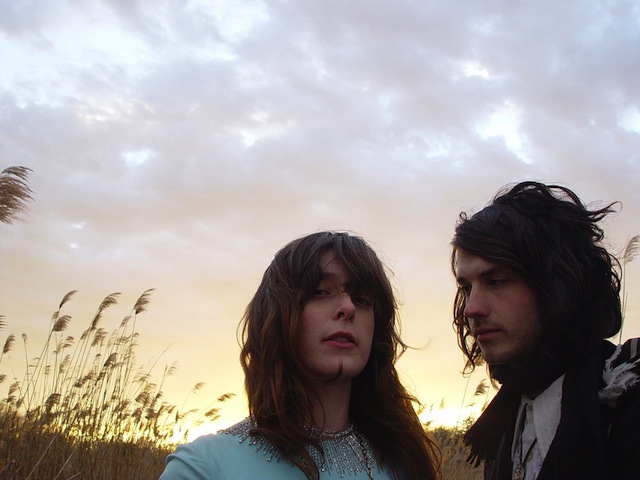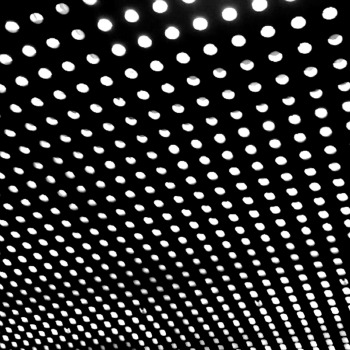Open Your "Frightened Eyes" To Beach House
By Eric Hehr in Arts & Entertainment on Oct 10, 2012 4:20PM

Victoria Legrand and Alex Scally of Beach House.
Few albums are able to grasp onto a specific mood so acutely that they curate a musical sub-genre in their wake: Beach House’s third full-length album, Teen Dream, is such an album.
When Beach House released Teen Dream in 2010—their first Sub Pop release—many publications dubbed the wistfully pensive album as one of the best of the year. Following the release of Teen Dream, the term “dream-pop” began to rapidly circulate amongst the indiesphere at large. Dream-pop eventually became a kind of explicit genre categorization for a brand of music that has the intimately sparse tonality of a bedroom recording and the ethereal beauty of a grandiose dream - one that you remember little from, but nonetheless plagues your waking hours. Heavy on the reverb. Light on the aggression.
Following the release of Teen Dream, the Baltimore based duo became indie darlings. Beach House was courted by tastemakers such as Pitchfork, who named Teen Dream the fifth best album of 2010: "Teen Dream captures Beach House in the midst of a great thaw, the frosty surfaces melting away to reveal full-blooded passion". Teen Dream managed to transcended Beach House from a relatively unknown indie duo into one of the most beloved modern bands on the market.
From here, Beach House was able to break into the mainstream circuit ala favorable reviews from Rolling Stone, BBC Music, and MTV without losing the hip-to-the-tip indie street cred garnished by Stereogum, Aquarium Drunkard, and the bearded audiophile behind the counter at your local independent record store. The following years saw Teen Dream being played everywhere from your local Urban Outfitters to that “under-the-radar, bohemian coffee house” in your “up and coming urban neighborhood.”
Two years later, Beach House released their fourth studio album, Bloom, co-produced by Chris Coady (Blonde Redhead, Yeah Yeah Yeahs), who had previously worked with Beach House on Teen Dream. Alex Scally, one half of Beach House, was aware of the positive reception of Teen Dream, and felt that Teen Dream was the first glimpse into the band finally finding their voice. With Bloom, he sought to capitalize on that unmistakable voice, and push the boundaries of the musical template established by Teen Dream even farther: "I hate it when bands change between records," Scally admitted. "That's not the way we work.”
The other half of Beach House, Victoria Legrand, felt as though Bloom was a higher extension of Teen Dream; a complete realization of their potential: “…For us there's a certain intensity with this record, and I think the title Bloom is an attempt at that."

Beach House's Bloom
At it’s best, Bloom is a cinematic headphone listen, filled with lush atmospheric textures that are far more complex and dense than Teen Dream. At it’s worst, Bloom is an undistinguishable collection of ear candy that floats in one ear and out the other, lacking the structural foundation to solidify anything of remembrance into the listener’s head.
Last time Beach House came through Chicago was during 2012’s Pitchfork Music Festival, which is an unfortunate climate to hear a band like Beach House—a band with such a texturized, delicate sound is usually not at their best when playing a large outdoor festival in the heat of a Chicago summer. But hearing Beach House’s detailed, bittersweet sound in the confines of an acoustically sound venue? In the nostalgic retrospection of a chilly Chicago fall?
Tomorrow, October 11, Beach House will perform at The Riviera Theater alongside supporting act Poor Moon. If there is a time and place to see Beach House, it’s this show. These transitional fall months in Chicago carry with them a kind of ambiguous introspection that is best scored by a band such as Beach House; a band that allocates itself in a kind of perpetual state of melodious magic hour, conjuring up images of over-exposed Polaroid’s of vacant childhood rooms and feelings of transcendent romance left unfulfilled.
Johann Wolfgang von Goethe once said, “Music begins where words end.” Beach House's music attempts to communicate indescribable emotions with flourishes of hazy hindsight, but its mysterious grandeur relies so much on its lavish atmosphere that these emotions aren’t so much communicated as they are faintly observed. Bloom is an expansion of Teen Dream, but does not stray far enough to differentiate itself. Albums blend into albums, and songs blend into songs.
Perhaps Beach House’s live set will further help distinguish their songs apart from each other, but you’ll have to go to The Riviera to find out. At the very least, Beach House’s live set will make a perfect soundtrack to a chilly October night in Chicago.
Beach House plays October 11 at The Riviera Theater, 4746 N Racine, 7:30 p.m., $24, all ages